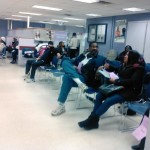By Brittney Herrera
Even though roughly half of Bronx families are supported by welfare, the stigma on relying on public assistance persists, with many recipients bearing the brunt of presumption.
“Some people’s perceptions of me being on EBT (Electronic Benefits Transfer) is that I am abusing my EBT,” said Jennifer Barona, 24, a single mother in the Bronx. “It feels very overwhelming.”

Welfare helps her take care of her two toddlers, but she doesn’t feel good about her situation. “The first time when I was in the waiting office, I was pregnant with my first toddler. There was a lot of ghetto people and I felt out of place,” said Barona.
The same went for Gabriela Aguilera, 20, who often feels “so low” when entering a welfare office.
“It is a place where people with no financial stability go to get assistance for their needs,” she said.
Figures from the U.S. Census Bureau show that at least 49 percent of Bronx families are on welfare. From 2007 to 2010, the number of people on welfare in the Bronx increased by 18 percent.
Citywide, welfare fraud indeed occurs. The city’s Investigation, Revenue and Enforcement Administration, tasked to investigate welfare abuses, recouped $28.7 million in inappropriate payments to the Supplemental Nutrition Assistance Program (SNAP) in 2013, according to the most available statistics.
Teens pick up their parents’ discomfort of pleading for help. Yadira, 17, whose last name was withheld for fear her friends would know her family’s on welfare, said young people are unaware of shame families feel in applying for welfare. “It is a little embarrassing, and teenagers are very immature nowadays with situations like this” Yadira said.
On the other hand, there are people who do not see welfare as necessarily a bad thing. Mauricio Berrios, 19, has a father who is on welfare. Though it doesn’t directly affect him, Berrios noted he “would feel comfortable because the way I see it is as an extra helping hand.”
But that doesn’t help Barona who said she often hears plenty of assumptions about welfare recipients. “Some stereotypes that I hear is ghetto, lazy, trashy people,” she said. “I am just a regular person from the borough of the Bronx.”





